|
Cylindromia auriceps? => Cylidromyia auriceps
|
|
| udo-walter |
Posted on 05-10-2018 21:33
|
|
Member Location: Posts: 13 Joined: 28.09.18 |
Hallo, i think it is Cylindromia auriceps. Fly from 16.07.2016, Size ca. 13mm. Germany, Saarland, Beckingen in my Home Garden. Thankyou
Edited by udo-walter on 11-10-2018 18:50 |
|
|
|
| John Carr |
Posted on 06-10-2018 01:23
|
|
Member Location: Posts: 9773 Joined: 22.10.10 |
The most common Cylindromyia with discal bristles on the abdomen is C. interrupta. C. auriceps lacks discals. |
|
|
|
| amaira |
Posted on 06-10-2018 10:39
|
|
Member Location: Posts: 414 Joined: 13.08.06 |
auriceps: abdomen usually with discal bristles. interrupta: Apical scutellar bristles missing. auriceps: Crossed apical bristles present. I can´t see if there are apicals or not. Edited by amaira on 06-10-2018 10:40 |
|
|
|
| John Carr |
Posted on 06-10-2018 12:19
|
|
Member Location: Posts: 9773 Joined: 22.10.10 |
All three photos of auriceps in the gallery (possibly only two specimens) lack discal bristles. I think I see small, crossed apical bristles on the scutellum. |
|
|
|
| amaira |
Posted on 06-10-2018 12:48
|
|
Member Location: Posts: 414 Joined: 13.08.06 |
Yes, I know about the gallery. I can´t say I know, Just read it here. |
|
|
|
| Zeegers |
Posted on 06-10-2018 18:47
|
|
Member Location: Posts: 18446 Joined: 21.07.04 |
* discals are variable in auriceps * thoracic colour pattern does not fit auriceps. * given the size of the flowers, your '13 mm.' must be off. It is a lot smaller * what looks like apical scutellar bristles, seems much too large for these. So I am thinking, it might be something else. * all in all, I am not certain. Either a auriceps with peculiar light or a interrupta with pseudo-apicals. Theo |
|
|
|
| udo-walter |
Posted on 08-10-2018 16:27
|
|
Member Location: Posts: 13 Joined: 28.09.18 |
Hallo, Can the enlargement help? I think 13mm is a bit too big, more like 10mm, measured by the flowers.
Edited by udo-walter on 08-10-2018 16:33 |
|
|
|
| Zeegers |
Posted on 09-10-2018 06:19
|
|
Member Location: Posts: 18446 Joined: 21.07.04 |
So the apicals are present and small. Auricps, after all. Theo |
|
|
|
| udo-walter |
Posted on 09-10-2018 09:34
|
|
Member Location: Posts: 13 Joined: 28.09.18 |
Hi Theo, I understand that correctly, it is C. auriceps. Greeting Udo |
|
|
|
| Jump to Forum: |


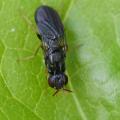



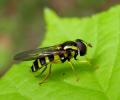
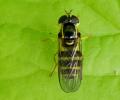

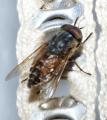
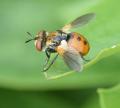



 but don't see the image in the post.
but don't see the image in the post.
